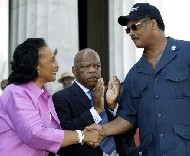Thousands commemorate famous King speech
Tens of thousands of celebrants gathered at the Lincoln Memorial on Washington’s central mall Saturday to mark the 40th anniversary of the late Martin Luther King Jr’s “I have a dream” speech that galvanized America’s civil rights movement.

King delivered the moving speech at the Lincoln Memorial on 28 August, 1963 to 250,000 people, one-fifth of them white, who had turned out for the March on Washington.
At the time, many blacks still were being denied the right to vote. Others were murdered for trying. Blacks and whites in the south often could not use the same restaurants, hotels or public restrooms and drinking fountains.
King, himself, was assassinated by a sniper at a Memphis, Tennessee, motel on 4 April, 1968. The fatal shot was fired by a white man, James Earl Ray, who died in prison in 1998.
“I have a dream that one day on the red hills of Georgia, the sons of former slaves and the sons of former slaveowners will be able to sit down together at a table of brotherhood,” King said, his vibrant voice sailing out over the expansive mall and reflecting pool from the steps of the Lincoln Memorial.
He would later receive the Nobel Peace Prize.
 |
|
King’s widow, Coretta Scott King greets veteran rights activist Jesse Jackson |
King’s son, Martin Luther King III, told Saturday’s crowd, “I know that my father was more than a dream.”
With black suffrage long a reality, King said the country must look to abolishing other injustices.
“We must abolish racial profiling,” he said, “and the death penalty.”
“I call on the Congress to establish a system that covers every person and every illness,” he said.
Saturday’s commemoration in downtown Washington was the third, after similar events in 1983 and 1993.
The original march demanded “jobs and freedom.” Forty years later, the slogans are much the same: King’s 40-year-old dream of equality has not been realised.
Plaque
The commemoration began on Friday night. Coretta Scott King placed a plaque to mark the spot on the steps of the Lincoln Memorial where her late husband made the speech. A recording of the speech was played during the run-up to the event.
Scott King said she hoped “in the not too distant future” people could come to view her husband’s dream not as a vision “but as a glorious reality.”
A hundred political, religious and civil rights groups joined to organise this year’s march and to demand justice for the more than 36 million African Americans who make up 12% of the US population.
|
The issue of affirmative action and racial preferences to boost blacks’ participation in professional activities is still controversial. |
One of the placards the National Association for the Advancement of Coloured People printed up for marchers said: “The NAACP refuses to believe the bank of justice is bankrupt.”
“The scales of justice are not balanced,” said Joyce, a volunteer for the NAACP. She tied strings onto the placards so that marchers could hang them around their necks, just as they did in 1963. “If you don’t have money and you are coloured … its going to be more difficult than when you are white,” she said.
Poverty
According to US statistics, one black youth in 10 between the age of 25 and 29 is in prison, compared with 2.9% of Latinos and 1.1% of whites.
Poverty disproportionately plagues the black population, 23% of which lives below the poverty line, compared with just 12% of whites.
The issue of affirmative action and racial preferences to boost blacks’ participation in professional activities is still controversial.
Walter Fauntroy, 70, who organised the 1963 march and the two later commemorations, challenged presidential candidates from the main two US political parties ahead of next year’s campaigning and election.
“Their names should not be on the ballot, on 2 November, 2004 if they haven’t pledged to end the reign of the white radical right,” said the former US legislator.
“We did it 40 years ago when we assembled 250,000 people at the Lincoln Memorial to demand a change in the public policy towards people of African descent who were required to drink water from separate fountains from those of white people.
“We will do it again.”